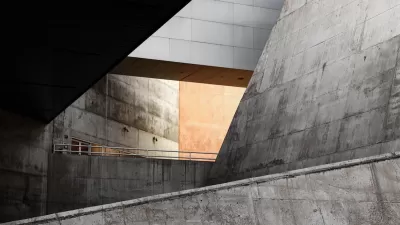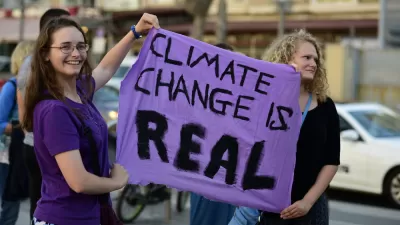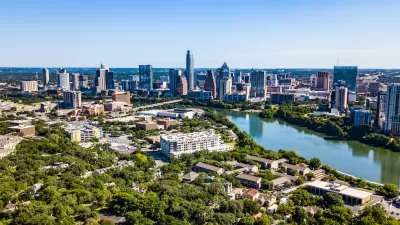The Prince George's County draft Climate Action Plan includes ambitious goals and timetables, but falls short of recommended targets for emissions reductions in the transportation sector.

In an opinion piece published in Greater Greater Washington, Bill Pugh reacts to Prince George's County's draft Climate Action Plan (CAP), calling for "a plan that helps create walkable, inclusive transit-oriented development that can drive economic prosperity and sustainable, equitable communities."
Pugh writes that while the CAP sets actionable goals and timelines and clearly illustrates the real impact of climate change, it does not go far enough to achieve the county's emissions reductions target. According to Pugh, the plan should take stronger action on transportation emissions, which make up the largest source of the county's greenhouse gas pollution.
National energy experts at Rocky Mountain Institute show that to adequately reduce climate pollution from transportation, the United States must make sure a quarter of cars on the road are clean electric vehicles by 2030 and also cut the amount Americans need to drive by 20%.In contrast, Prince George’s climate plan falls short on both accounts: it calls for only 15% of cars, SUVs and pickups in the county to be electric by 2030 and seeks a meager 3.6% reduction in how much families and workers in the County have to drive on a daily basis.
However, the plan does propose new growth management policies and encourages infill development and affordable housing production, prioritizing development in dense, transit-accessible areas.
Pugh also recommends that the plan, which will be finalized in early 2022, include advocacy for regional efforts to build more affordable, transit-oriented housing developments.
FULL STORY: Prince George’s climate plan proposes swift action, but how does it address transportation and land use?

What ‘The Brutalist’ Teaches Us About Modern Cities
How architecture and urban landscapes reflect the trauma and dysfunction of the post-war experience.

‘Complete Streets’ Webpage Deleted in Federal Purge
Basic resources and information on building bike lanes and sidewalks, formerly housed on the government’s Complete Streets website, are now gone.

The VW Bus is Back — Now as an Electric Minivan
Volkswagen’s ID. Buzz reimagines its iconic Bus as a fully electric minivan, blending retro design with modern technology, a 231-mile range, and practical versatility to offer a stylish yet functional EV for the future.

Healing Through Parks: Altadena’s Path to Recovery After the Eaton Fire
In the wake of the Eaton Fire, Altadena is uniting to restore Loma Alta Park, creating a renewed space for recreation, community gathering, and resilience.

San Diego to Rescind Multi-Unit ADU Rule
The city wants to close a loophole that allowed developers to build apartment buildings on single-family lots as ADUs.

Electric Vehicles for All? Study Finds Disparities in Access and Incentives
A new UCLA study finds that while California has made progress in electric vehicle adoption, disadvantaged communities remain underserved in EV incentives, ownership, and charging access, requiring targeted policy changes to advance equity.
Urban Design for Planners 1: Software Tools
This six-course series explores essential urban design concepts using open source software and equips planners with the tools they need to participate fully in the urban design process.
Planning for Universal Design
Learn the tools for implementing Universal Design in planning regulations.
City of Albany
UCLA Lewis Center for Regional Policy Studies
Mpact (formerly Rail~Volution)
Chaddick Institute at DePaul University
City of Piedmont, CA
Great Falls Development Authority, Inc.
HUDs Office of Policy Development and Research





























